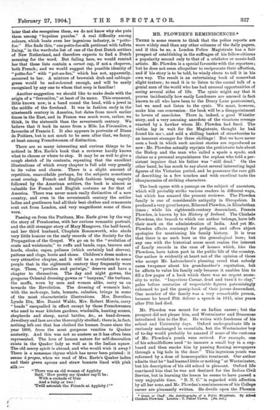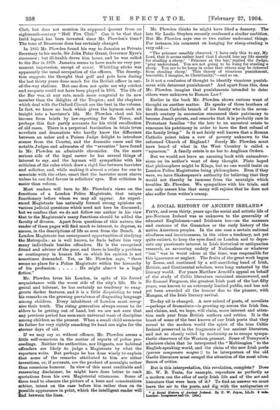MR. PLOWDEN'S REMINISCENCES.*
THERE is some reason to think that the police reports are more widely read than any other columns of the daily papers, and if this be so, a London Police Magistrate has a fair prospect of establishing in the suffrages of his fellow-citizens a popularity second only to that of a cricketer or music-hall artiste. Mr. Plowden is a special favourite with the reporters; but he does not seem altogether to reciprocate their affection, and if his story is to be told, he wisely elects to tell it in his own way. The result is an entertaining book of somewhat slight texture; to read it is to listen to the casual talk of a genial man of the world who has had unusual opportunities of seeing several sides of life. The cynic might say that it proves incidentally how easily Londoners are amused (a fact. known to all who have been to the Drury Lane pantomime), but we need not listen to the cynic. We must, however, make him one concession : the book will be a disappointment to lovers of anecdotes. There is, indeed, a good Whistler story, and a very amusing anecdote of the vicarious revenge exacted by a hawker whom Mr. Plowden had fined. The victim lay in wait for the Magistrate, thought he had found his ma-1, and sold a shilling basket of strawberries to an innocent stranger for three shillings ! But we have never seen a book in which such ancient stories are reproduced as new : Mr. Plowden actually reprints the prehistoric tale about the Bishop and the man who called a spade a spade, and claims as a personal acquaintance the orphan who told a per- sistent inquirer that his father was "still dead." On the other hand, he has much to say about several interesting legal figures of the Victorian period, and he possesses the rare gift of describing in a few touches and with excellent taste the idiosyncrasies of striking characters.
The book opens with a passage on the subject of ancestors, which will probably strike various readers in different ways, but which has amazed the present reviewer. The Plowden family is one of considerable antiquity in Shropshire. It produced a very great lawyer, Edmund Plowden, in Elizabethan times • while his eighteenth-century descendant, Francis Plowden, is known by his History of Ireland. The Chichele Plowdens, the branch to which our author belongs, have left their mark on the administration of India. And yet Mr. Plowden affects contempt for pedigree, and offers abject apologies for mentioning his family history. It is true that there is no such bore as the genealogical bore; but any one with the historical sense must realise the interest of family records in the case of houses which, like the Plowdens, have taken part in the public life of the country. Our author is evidently at heart not of the opinion of those who accept Mr. Labouchere's pleasing creed that nobody cares twopence about his grandmother's reputation, but be affects to value his family only because it enables him to fill a few pages of a book which there was no urgent neces- sity to write. "Imperious Caesar, dead and turn'd to clay," pales before centuries of respectable figures patronisingly exhumed to pad the gossip-book of their jocose descendant. One member of the family was a very remarkable person, because he heard Pitt deliver a speech in 1815, nine years after Pitt had died.
Mr. Plowden was meant for an Indian career ; but the prospect did not please him, and Westminster and Brasenose introduced him to the Bar. He writes with freshness of his school and University days. Oxford undergraduate life is curiously unchanged in essentials, but the Westminster boy of to-day would probably be amazed if some of the customs of Mr. Plowden's youth were revived. For example, one of his schoolfellows used "to immure a small boy in a cup- board and then smoke him by passing flaming newspapers through a big hole in the door." This ingenious youth was reformed by a dose of homoeopathic treatment. Our author admits that be" had learned little or nothing "at Westminster, but his description of his old school is pleasant. Oxford life convinced him that he was not destined for the Indian Civil Service, but in learning the lesson he seems to have passed a very enjoyable time. "B. N. C." is regarded with affection by all her sons, and Mr. Plowden's reminiscences of his College career are pleasantly written. He dwells upon the Phoenix • Grain or Chaff : the Autobiography of a Polio.: Magistrate. By Alfred Chichele Plowden. London; T. Fisher Unwin. [16a. net.]
Club, but does not mention its supposed descent from an eighteenth-century "Hell Fire Club." Can it be that that lurid legend has been invented since Mr. Plowden's time? The tone of Brasenose dons has certainly changed.
In 1865 Mr. Plowden found his way to Jamaica as Private Secretary to his uncle, Sir John Peter Grant, Governor Eyre's successor ; but ill-health drove him home, and he was called to the Bar in 1870. Jamaica seems to have made no very per- manent impression, except of ennui. Whittling sticks was apparently the usual oecupation of the officers. The descrip- tion suggests the thought that golf and polo have during the last thirty years done much for the British officer in out- of-the-way stations. But one does not quite see why cricket and racquets could not have been played in 1865. The life of the Bar was, at any rate, much more congenial to its new member than the delights of the Tropics ; and the chapters which deal with the Oxford Circuit are the best in the volume. In fact, we know no book which gives the layman such an insight into a barrister's life. Mr. Plowden eked out his income from briefs by law-reporting for the Times, and perhaps this fact partly accounts for his vivid recollection of old cases. There is a perpetual fascination in trials (even novelists and dramatists who hardly know the difference between an usher and a Puisne Judge delight to introduce scenes from the Courts), and the dramatic cases and the notable Judges and advocates of the " seventies " have found in Mr. Plowden an admirable chronicler. On the more serious side of the legal career he has several things of interest to say, and the layman will sympathise with his criticism of the rules which draw a rigid line between barrister and solicitor, and, while making it almost a crime for one to associate with the other, enact that the barrister must starve unless he can find favour in solicitors' eyes. But criticism is easier than reform.
Most readers will turn to Mr. Plowden's views on the functions of a London Police Magistrate, that unique functionary before whom we may all appear. An experi- enced Magistrate has naturally formed strong opinions on various judicial questions which need not here be discussed ; but we confess that we do not follow our author in his view that to the Magistrate's many functions should be added the faculty of divorce. Apart from questions of this nature, the reader of these pages will find much to interest, to depress, to amuse, in the descriptions of life as seen from the Bench. A London Magistrate has unsurpassed opportunities of studying the Metropolis : as is well known, he finds before him very many individuals besides offenders. He is the recognised friend and adviser of the poor, and there is hardly a problem er contingency in human life on which his opinion is not tometimes demanded. Yet, as Mr. Plowden says, "there seems no place for a Police Magistrate within the hierarchy
of his profession. He might almoqt be a legal fiction."
Mr. Plowden loves his London, in spite of his forced acquaintance with the worst aide of the city's life. He is genial and tolerant, he has certainly no tendency to exag- gerate darker features, and it is a little disquieting to read his remarks on the growing prevalence of disgusting language among children. Every inhabitant of London must recog- nise their truth. The rising generation always seems to its elders to be getting out of hand, but we are not sure that any previous period has seen such universal want of discipline among children as the present. When a small child BM:131110118 its father for very rightly smacking its head one sighs for the sterner days of old.
• If we may say so without offence, Mr. Plowden seems a little self-conscious in the matter of reports of police pro- ceedings. Neither the authorities, nor litigants, nor habitual offenders are likely to judge a Magistrate by what the reporters write. But perhaps he has done wisely to explain that some of the remarks attributed to him are either inventions, or, if accurate, are the product of neuralgia rather than conscious humour. In view of this most creditable and reassuring disclaimer, he might have done better to omit quotations from his own Magisterial utterances. Some of • them tend to obscure the picture of a keen and conscientious arbiter, intent on the case before him rather than on its
tae ksible appearance in prin which the intelligent reader will between the lines.
late Sir Leslie Stephen recently confessed a similar ambition. But Mr. Plowden says one or two rather undecanal things.
For instance, his comment on hanging for sheep-stealing is very odd :—
" The prisoner sensibly observed, I have only this to say, My Lord, that it seems rather hard that I should lose my life merely for stealing a sheep." Prisoner at the bar,' replied the Judge, 'pray understand. You are not going to be hung for stealing a sheep. You are to be hung in order that others may be deterred from stealing sheep.' This theory of vicarious punishment, traceable, I imagine, to Christianity,"—and so on.
Is it not a confusion of thought to identify vicarious punish- ment with deterrent punishment? And apart from this, does Mr. Plowden imagine that punishments intended to deter
others were unknown to Roman Law ?
Earlier in the book Mr. Plowden shows curious want of thought on another matter. He speaks of three brothers of the Roman Catholic branch of his family who in the seven- teenth century in succession renounced their patrimony to become Jesuit priests, and remarks that it is probably rare in Protestant families "for the heir to an ancestral estate to
renounce his patrimony in order to have the first refusal of the family living." Is it not fairly well known that a Roman Catholic priest takes a vow of poverty unknown to the reformed Church of England? Surely Mr. Plowden must have heard of what in the West Country is called a
" squarson." A family estate is no bar to Anglican Orders. But we would not leave an amusing book with animadver- sions on its author's want of deep thought. Plato hoped that philosophers might be Kings, but no one would insist on London Police Magistrates being philosophers. Even if they were, we have Shakespeare's authority for believing that they would not thereby be immune from the neuralgia which troubles Mr. Plowden. We sympathise with his trials, and can only assure him that many will rejoice that he does not also suffer from writer's cramp.











































 Previous page
Previous page